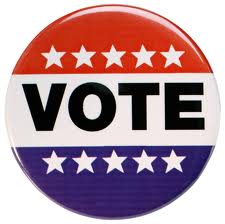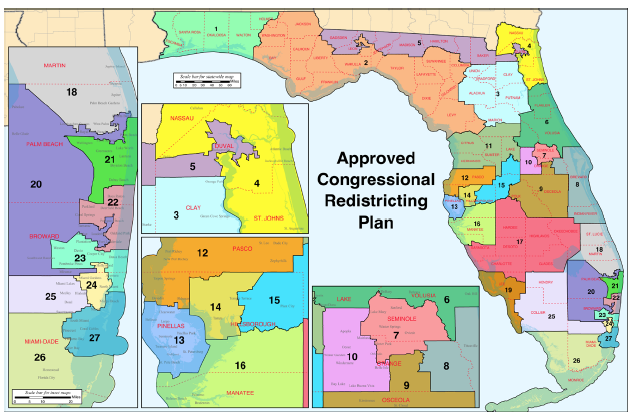Early Voting Information
The Division of Elections has posted an early voting locations and times summary for the general election.
Depending on the county you live in, Primary Early Voting may have begun…
Early voting for Florida’s August 30th primary has begun in many counties. Curious about your county? Check this list published by the State. Early voting must begin in all counties by August 20th.
3rd DCA: Check Bounced by Mistake Still Costs Spot on the Ballot
The Third District Court of Appeal, on expedited review, upheld a lower court ruling that found that a candidate for mayor of the City of Miami Gardens had been properly excluded from the ballot because his qualifying check bounced, even though he had enough funds in his account and it appears the bank in questions made an error. The reason for this is the “plain and unambiguous” wording of the qualifying statute, which provides at Section 99.061(7)(a)1:
(7)(a) In order for a candidate to be qualified, the following items
must be received by the filing officer by the end of the qualifying
period:
1. A properly executed check drawn upon the candidate’s campaign
account payable to the person or entity as prescribed by the filing
officer in an amount not less than the fee required by s. 99.092, unless
the candidate obtained the required number of signatures on petitions
pursuant to s. 99.095. The filing fee for a special district candidate is
not required to be drawn upon the candidate’s campaign account. If a
candidate’s check is returned by the bank for any reason, the filing
officer shall immediately notify the candidate and the candidate shall
have until the end of qualifying to pay the fee with a cashier’s check
purchased from funds of the campaign account. Failure to pay the fee
as provided in this subparagraph shall disqualify the candidate.
As the bounced check was not returned until after the qualifying period had ended, the court found, with “tremendous distaste for the result” that they were compelled by the statute to affirm the lower court’s denial of any relief. This holding was consistent with a First District Court of Appeal opinion in 2014, which found that the Legislature had specifically removed the prior 48 hour cure period for bounced checks that existed prior to 2011. That case triggered a vehement dissent on the denial of rehearing en banc.
The Third District Court of Appeal did certify the following question as one of great public importance:
Does section 99.061(7)(a)1. require a candidate’s disqualification when the candidate’s qualifying fee check is returned by the bank after the expiration of the qualifying period due to a banking error over which the candidate has no control?
Whether the Supreme Court will consider this question is discretionary, and the Court, in 2014, declined the acceptance of jurisdiction of the First District case.
Thinking about delegates
Given the presidential campaign this year, more and more attention is starting to be paid to what will happen at this year’s nominating conventions. As this TBT article outlines, on the Republican side of the aisle, competition is fierce for the 99 delegate and 96 alternate delegate spots for the July 18-21 event in Cleveland, Ohio. The Republican state party has provides their delegate process online at this page.
The Green Papers, an excellent resource for election information (if a bit old-school in its HTML), outlines that the delegate allocation is as follows: 99 total delegates – 10 base at-large / 81 re: 27 congressional districts / 3 party / 5 bonus. Florida was a “winner take all” state for this party, resulting in all delegates pledged to one candidate.
How long are these delegates bound? According to a September 2015 copy of the RPOF Rules posted by the Martin County, Florida affiliate:
10 B. All Delegates and Alternate Delegates Awarded to Statewide Winner of Florida Presidential Preference Primary
The Republican presidential candidate receiving the highest number of statewide votes at the Florida Presidential Preference Primary shall be awarded all delegates and alternate delegates to the Republican National Convention. The delegates and alternate delegates shall be elected as prescribed by Rule 10(D). The Chairman of the Republican Party of Florida, or his or her designee, shall be bound to count and cast all delegate votes for that presidential candidate during the first three convention ballots unless the convention rules state that delegates are bound for more than three ballots. If the candidate to whom the delegate votes are bound releases the delegates or withdraws his or her candidacy, then the delegate votes will not be bound to any candidate. No delegate, other than the Chairman of the Republican Party of Florida, or his or her designee, shall be entitled to cast any vote on his or her own behalf until the fourth convention ballot. (emphasis added)
There are some questions being raised, however, as to whether any of the delegates are actually bound to their state’s choices.
VOTE!
Florida Supreme Court affirms 4th DCA ruling declaring F.S. 99.0615 invalid
In Jennifer Brinkmann v. Tyron Francois, etc., et al., the Florida Supreme Court affirmed the Fourth District Court of Appeal’s prior ruling declaring F.S. 99.0615 invalid. The statute provided:
F.S. 99.0615 Write-in candidate residency requirements.—At the time of qualification, all write-in candidates must reside within the district represented by the office sought.
The Court found the statute to be facially unconstitutional because it directly conflicted with the Florida Constitution’s requirement that requires residency in a particular district at the time of election, not at qualification. The Court went on to determine that write-in candidates are considered to be “opposition” under Flordia’s election laws, meaning the presence of a write-in candidate will continue to result in the closing of a primary election to only those who are members of that political party.
In an interesting paragraph, the Court turned to the dictionary to define the term “opposition”:
“According to dictionary definitions, “opposition” meant “a position confronting another or placing in contrast; that which is or furnishes an obstacle to some result.” Black’s Law Dictionary, 1093 (6th ed. 1990). It was also defined as an “act of opposing,” a “hostile or contrary action or condition,” and “something that opposes,” or “a political party opposing and prepared to replace the party in power.” Merriam-Webster’s Collegiate Dictionary 816 (10th ed. 1998). The act of “opposing” was “appli[cable] to any conflict” and synonymous with “set[ting] oneself against someone or something.” Id. Conversely, someone or something was “opposed” if he, she, or it was “set or placed in opposition.” Id. Additionally, an “opponent” was “one that takes an opposite position (as in a debate, contest, or conflict).” Id. at 815.”
Florida Supreme Court decides on new Congressional District Map
With the eighth opinion since the adoption of the Fair Districts Amendment to the Florida Constitution, the Florida Supreme Court approved the above Congressional Redistricting Plan for the 2016 elections and beyond. The map approved was the trial court’s choice – map CP-1 – proposed by the Coalition Plaintiffs who had challenged the Legislature’s redistricting plans.
Williams-Yulee v. Florida Bar audio posted
The Supreme Court has posted the audio files for the Williams-Yulee v. Florida Bar case at this site.
Williams-Yulee v. Florida Bar heard by U.S. Supreme Court
The audio recording of the argument in Williams-Yulee v. Florida Bar, regarding whether Florida’s rule of judicial conduct that prohibits candidates for judicial office from personally soliciting campaign funds violates the First Amendment, won’t be posted until the end of the week, but SCOTUSblog has two pieces that provide insight into the proceedings:
- Argument analysis: Running for a court seat, tin cup in hand?
- Justices debate limits on solicitations by judges: In Plain English
- 1
- 2
- 3
- …
- 15
- Next Page »



